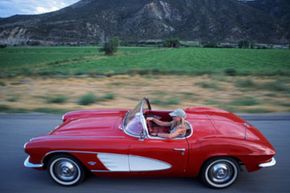Probate is behind you, but you're not done with fees and paperwork yet. You've still got to take care of the taxes, tag and registration. To do that, assess the car you've inherited.
That may sound simple, and if you're the new owner of an '84 Bronco, you probably don't have much to worry about. But let's say you hit the inheritance jackpot and have been bequeathed a rare, much-sought-after car -- or even a rundown mass-produced classic. In these scenarios, it might be difficult to accurately estimate the value of the car.
Why is that so important? You'll need to know what the vehicle is worth in order to pay the proper taxes during the registration process. Since every automobile has a different value that's determined by condition and wear and tear, the overall worth of your inheritance could be substantially more (or less) than the Kelley Blue Book value or an estimate from Edmunds or the National Automobile Dealers Association (NADA). To play it safe, you may want to have a professional appraiser look the car over.
Once you've determined the value of the car, head on down to your local DMV to pay for your tag and registration fees. You probably won't be charged a sales tax (after all, you haven't bought anything), but, depending on where you're registering the vehicle, you may have to shell out for property or use tax.
And then, there's the much ballyhooed-about inheritance tax. You won't be bothered with this unless the vehicle is part of a sizable estate (one worth at least $1 million) or you're the deceased's spouse. Inheritance tax laws vary by state, but typically, "Class A" relatives (parents, children and grandchildren) won't pay as much as more distant relatives and unrelated acquaintances, such as friends and employees.
Inheritance tax won't be a problem for most of us, but if your favorite uncle left you the keys to his 1961 Ferrari 250 GT California, you'll understand all the fuss. You might suddenly owe Uncle Sam a million bucks or more, as the inheritance tax can claim more than 15 percent of the estimated value of your inheritance. Many states have begun reducing or even eliminating the inheritance tax, though there are many areas of the country where it still exists.
If you'd like to sell your car, you're free to do so as soon as you're through with the probate process. However, if the value of the vehicle has increased since you took ownership, you're headed for a collision with the capital gains tax. So, say for example, you inherited that 250 GT California back in 1983, and you're looking to sell it now. Even though you've owned the vehicle for the better part of three decades, you're going to have to pay taxes on its increased value. In this case, the tax would be substantial, as this little speedster became one of the most valuable cars in the world after Ferris Bueller took it for a spin on his "Day Off" in 1986 (this model can sell for $11 million or more!). Of course, you may be tempted to keep the sale a secret, but trust us, it's not a good idea. The IRS has a tendency to keep track of assets like that, and you don't want to pay interest and penalties on top of those pricey capital gains.




